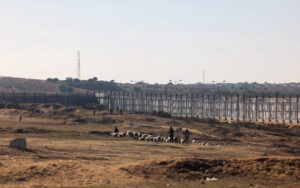After decades of efforts to keep the Hamas threat in check, Gaza’s southernmost city of Rafah — and the Philadelphi Route running between it and Egypt’s border — once again is a major problem for Israel.
Palestinians began digging tunnels under Israel’s border fences during the First Intifada in the late 1980s, and in the ensuing decades, the Israel Defense Forces tried a range of methods to uncover the tunnels and keep terrorist groups from bringing in deadly new weapons.
The focus was on the Philadelphi Route, the 14-kilometer security road dividing the Gazan and Egyptian sections of Rafah. But it was perilous work. During the Second Intifada, the corridor is where 13 IDF soldiers were killed in the 2004 APC Disaster, and Hamas managed to detonate explosives under the JVT outpost, killing five soldiers.
Over the objections of Israel’s security services and many officials, Israel withdrew from the Philadelphi Route in the 2005 withdrawal from Gaza. Israel allowed Egypt to introduce 750 heavily armed border guards, but they failed to prevent a massive increase in smuggling into the Strip.
When Hamas forcibly ejected the Palestinian Authority from Gaza in 2007, they used the tunnels — and occasional destruction of the Egypt border fence — to fill their coffers, and to build up their military capabilities.

